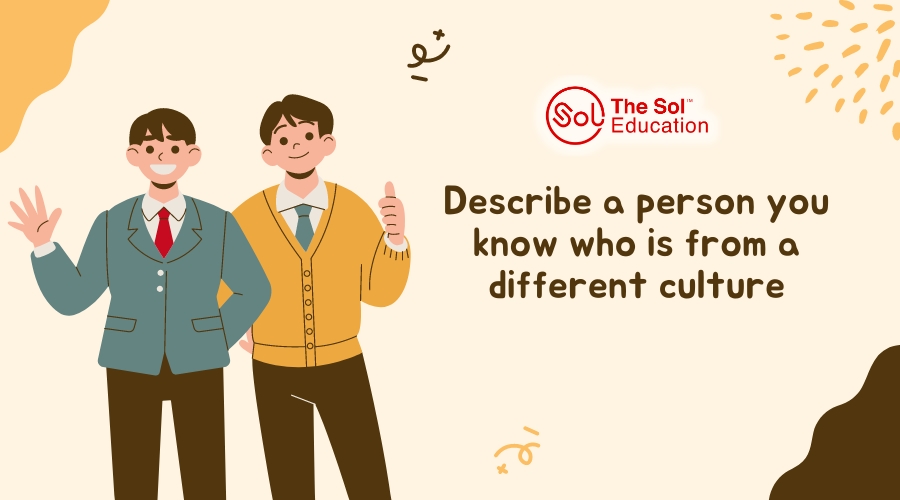Câu trả lời tham khảo cho phần thi IELTS Speaking part 2, part 3: Describe a person you know who is from a different culture
IELTS Speaking part 2
Đề bài
Describe a person you know who is from a different culture
You should say:
- Who he/she is
- Where he/she is from
- How you knew him/her
- And explain how you feel about this person

Sample
The person I’d like to talk about who is from a different culture is a co-worker of mine called Jez. Jez is from America. We have a lot of exposure to Americans and the key symbols of American culture, from the world of music, cinema and popular culture.
One could argue that American world domination has come in the form of commercialism, big business, and a drive for free markets and entrepreneurship. Whatever we may think of America and Americans, of the good things and the bad things – the point is: Jez really is from a different culture to me, and the more we work together the more I realise what some of these differences are.
I’ll talk here very concisely about a couple of positive and negative aspects of his culture, the way I see it. Americans seem to be quite open, direct, and general motivated and positive on the surface. They aren’t very reserved really – at least not about superficial things, and at least not in public. They exude a certain confidence, and that can be inspiring and welcoming, too, because they can also be quite positive about others. I’ve had a lot of encouragement from him at work, for example.On the other hand, I can’t help thinking that sometimes he’s a bit simple-minded. At times, it seems that they are too open and outspoken and put on too much of a ‘positive face’ with everything, and at the same time are too critical of other people’s cultures, and don’t make that much effort to really deeply understand them.
So, with Jez, I have experienced both positive and not-so-positive aspects of American culture. I feel good about him, though, he’s a colleague and friend and after all. We have to accept people have different ways in the global world we live in today.
Từ vựng hữu ích
- co-worker /ˈkoʊˌwɜːrkər/ (noun): Đồng nghiệp - A person with whom one works, typically someone in a similar role or level within an organization.
- exposure /ɪkˈspoʊʒər/ (noun): Tiếp xúc - The state of being subject to something, especially something unpleasant or harmful.
- symbols /ˈsɪmbəlz/ (noun): Biểu tượng - Things that represent or stand for something else.
- commercialism /kəˈmɜːrʃəlɪzəm/ (noun): Thương mại hoá - The emphasis on maximizing profit or revenue through advertising and sales.
- domination /ˌdɒmɪˈneɪʃən/ (noun): Sự thống trị - The exercise of control or influence over something.
- drive /draɪv/ (noun): Sự thúc đẩy - Determination and ambition to achieve something.
- entrepreneurship /ˌɑːntrəprəˈnɜːrʃɪp/ (noun): Tinh thần doanh nhân - The activity of setting up a business or businesses, taking on financial risks in the hope of profit.
- concisely /kənˈsaɪsli/ (adverb): Ngắn gọn - In a brief and to-the-point manner.
- positive /ˈpɒzətɪv/ (adjective): Tích cực - Expressing approval or agreement.
- negative /ˈnɛɡətɪv/ (adjective): Tiêu cực - Expressing denial, disagreement, or refusal.
- aspects /ˈæspɛkts/ (noun): Khía cạnh - Different parts or features of something.
- open /ˈoʊpən/ (adjective): Mở cửa - Willing to consider or deal with new ideas; accessible and transparent.
- direct /dɪˈrɛkt/ (adjective): Trực tiếp - Straightforward and honest in manner or speech.
- motivated /ˈmoʊtɪveɪtɪd/ (adjective): Động viên - Having a strong reason or desire to do something.
- positive on the surface /ˈpɒzətɪv ɒn ðə ˈsɜːrfɪs/ (phrase): Tích cực bề ngoài - Displaying a positive attitude outwardly.
- reserved /rɪˈzɜːrvd/ (adjective): Dè dặt - Slow to reveal emotions or opinions.
- superficial /ˌsuːpərˈfɪʃəl/ (adjective): Hời hợt - Concerned with or understanding only what is on the surface; shallow.
- confidence /ˈkɒnfɪdəns/ (noun): Tự tin - The feeling or belief that one can have faith in or rely on someone or something.
- inspiring /ɪnˈspaɪrɪŋ/ (adjective): Truyền cảm hứng - Providing motivation or encouragement.
- welcoming /ˈwɛlkəmɪŋ/ (adjective): Mến khách - Friendly and receptive towards newcomers.
- encouragement /ɪnˈkɜːrɪdʒmənt/ (noun): Sự động viên - The action of giving someone support, confidence, or hope.
- simple-minded /ˈsɪmpl ˈmaɪndɪd/ (adjective): Ngây thơ - Having or showing a lack of intelligence or sophistication.
- outspoken /ˌaʊtˈspoʊkən/ (adjective): Thẳng thắn - Expressing opinions or ideas openly and confidently.
- critical /ˈkrɪtɪkəl/ (adjective): Phê phán - Expressing disapproval or pointing out faults or shortcomings.
- effort /ˈɛfərt/ (noun): Sự nỗ lực - Physical or mental activity exerted to achieve a purpose or result.
- accept /əkˈsɛpt/ (verb): Chấp nhận - Agree to receive or undertake something offered.
IELTS Speaking part 3
1. Where and how can we get to know people of different cultures better?
Well, I believe that mingling with people from diverse cultures can be an eye-opening experience. To connect with individuals from different backgrounds, one could attend local cultural events or workshops. Also, joining language exchange programs or international clubs is a great way to forge meaningful connections. Traveling, too, provides an authentic way to immerse oneself in various cultures and build friendships with locals.
- Mingling (noun): /ˈmɪŋɡlɪŋ/ - giao thoa, gặp gỡ
- Diverse (adjective): /daɪˈvɜːrs/ - đa dạng
- Connect (verb): /kəˈnekt/ - kết nối
- Attend (verb): /əˈtend/ - tham dự
- Immerse (verb): /ɪˈmɜːrs/ - đắm chìm
- Forge (verb): /fɔːrdʒ/ - xây dựng
- Meaningful (adjective): /ˈmiːnɪŋfəl/ - có ý nghĩa
2. What are the advantages and disadvantages of cultural diversity?
Cultural diversity is a double-edged sword, in my opinion. On the bright side, it fosters a sense of unity in diversity, promoting understanding and collaboration among people. Exposure to different cultural perspectives ignites creativity and broadens our outlook. However, navigating through varying cultural norms and languages can sometimes lead to misunderstandings. Yet, I genuinely believe that embracing diversity enriches our global community.
- Eye-opening (adjective): /ˈaɪˌoʊˌpənɪŋ/ - mở mang tầm mắt
- Unity in diversity (phrase): /ˈjuːnəti ɪn daɪˈvɜːrsəti/ - sự đoàn kết trong đa dạng
- Collaboration (noun): /kəˌlæbəˈreɪʃən/ - sự hợp tác
- Outlook (noun): /ˈaʊtˌlʊk/ - viễn cảnh, quan điểm
- Misunderstanding (noun): /ˌmɪsʌndərˈstændɪŋ/ - sự hiểu lầm
- Embrace (verb): /ɪmˈbreɪs/ - đón nhận
- Enrich (verb): /ɪnˈrɪtʃ/ - làm giàu, làm phong phú
3. How can traditional culture and other cultures coexist?
Coexisting traditional and other cultures is about striking a balance, I think. Communities need to cherish their heritage while being open to the beauty of diverse cultures. Cultural exchange events and workshops serve as bridges that bring people together for insightful conversations and learning. It's crucial to nurture an environment where traditions are respected, and new cultural influences are appreciated, creating a beautiful tapestry of coexistence.
- Coexist (verb): /ˌkoʊɪɡˈzɪst/ - cùng tồn tại
- Striking a balance (phrase): /ˈstraɪkɪŋ ə ˈbæləns/ - thỏa thuận một sự cân đối
- Cherish (verb): /ˈʧerɪʃ/ - trân trọng
- Exchange (noun): /ɪksˈʧeɪndʒ/ - trao đổi
- Insightful (adjective): /ˈɪnˌsaɪtfl/ - sâu sắc
4. Which Vietnamese traditions are disappearing?
In Vietnam, the winds of change are gradually sweeping away some cherished traditions. For instance, the intricate art of crafting banh chung (sticky rice cake) during Tet or crafting traditional items like conical hats seems to be fading. The deep-rooted practice of ancestor worship, while still present, might be waning among the younger generation. However, preservation endeavors, such as cultural education initiatives and heritage showcases, are working towards safeguarding these valuable traditions.
- Fading (verb): /ˈfeɪdɪŋ/ - mờ dần, tàn dần
- Craft (verb): /kræft/ - chế tạo
- Deep-rooted (adjective): /diːp ˈruːtɪd/ - sâu rễ
- Ancestor worship (phrase): /ˈænsestər ˈwɜːrʃɪp/ - tín thần bái tổ tiên
- Safeguarding (noun): /ˈseɪfgɑːrdɪŋ/ - bảo vệ
Trên đây, SOL đã chia sẻ với các bạn các câu trả lời tham khảo cho đề bài IELTS Speaking part 2 và part 3 về culture, cũng như cung cấp thêm một số từ vựng hay cho chủ đề này. Hy vọng sẽ là nguồn tài nguyên có giá trị dành cho các bạn.
Đừng ngại liên hệ với SOL nếu bạn cần hỗ trợ nhé.

